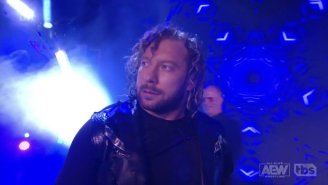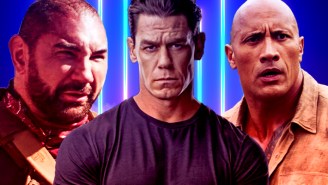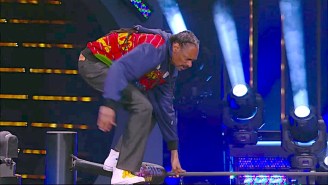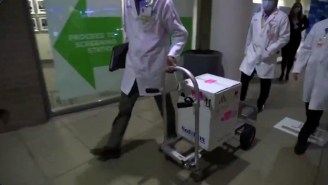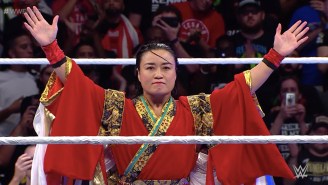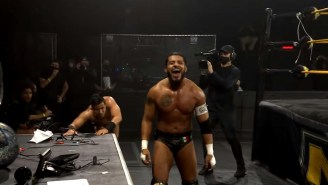On May 19, 1996, Kevin Nash, Scott Hall, Shawn Michaels, and Triple H held conference in the ring after a cage match at Madison Square Garden; it was the infamous “curtain call,” and just days prior to Nash and Hall parting ways with the WWF before venturing into WCW. Vince McMahon saw the “curtain call” as not only “bad for business,” but also bad for Triple H. His future son-in-law would have to reap the aftermath of the house show incident: Michaels was the champ, and Nash and Hall were under contract with the Atlanta-based organization.
Triple H’s punishment was being relegated to lower-card matches and insignificant feuds. Before that, however, he was to job in a squash match at WrestleMania XII against the returning Ultimate Warrior, a larger-than-life WWF superstar who helped place the sports-entertainment giant on the map in the late ’80s. Warrior was a flashy superstar, rippling with muscle and doused in vibrant colors and facepaint. His frenetic entrance saw him sprint into the ring and shake the ropes with the force of a hurricane. His interview style was unique, to say the least — speaking in abstract forms, he called upon the gods who created him, and often cited cosmic and metaphysical terms in breaking down his next opponent.
There was another side to the Warrior, though, one that’s detailed greatly in WWE’s 2005 DVD release, The Self-Destruction of The Ultimate Warrior. In it, there are various tales of Warrior’s inability to do business correctly. Before SummerSlam 1991, Warrior detailed a letter to Vince McMahon telling him that he would “no-show” the scheduled main event bout if he was not paid $500,000 that was allegedly owed to him. In response, Hulk Hogan threatened to attack the Warrior backstage, but McMahon nixed the idea, paying him the money he requested then subsequently suspending him after the pay-per-view. Warrior parted ways with the company following the suspension. (Warrior denied holding the main event at ransom in a scathing response on his website.)
In the DVD, Triple H calls Warrior one of the most “unprofessional” athletes he’s ever worked with. That comment is in reference to their meeting on the WrestleMania XII stage. Warrior had made amends with the company and returned for one more run in 1996. Before their scheduled match, Triple H allegedly came to the Warrior with a slew of ideas about how the match should go. Gerald Brisco — a WWF agent — was by Triple H’s side during this discussion, and Warrior took offense to the maneuver, shooting down his ideas, and telling him in a not-so-polite way that Brisco’s presence was unnecessary.
The backstage incident and following match, which saw Triple H get little to no offense in on the returning Warrior, left a bad taste in Hunter’s mouth. The war of words between the two only escalated with the 2005 DVD that effectively buried all of Warrior’s contributions to the business. In response to Triple H’s comments in the DVD, Warrior wrote:
I’m the most unprofessional person you’ve ever stepped into the ring with? Well, now, ain’t that pretty. Because what I remember, Mr. Stephanie McMahon, is that you were only in the ring with me one time — and for less than 5 minutes. Here all these years since leaving the ring and becoming interested in mentoring young people, I often wonder what kind of impact I am having because I take it seriously and it is important to me do it effectively. Well, it sure sounds like I taught you very well in the 5 minutes you had in the ring with me. Because from what I hear you are the biggest unprofessional asshole the business has ever seen. You are welcome.
After his time with the WWF was done, Warrior bounced around, appearing in WCW for a short-lived feud with Hulk Hogan, and doing indy shots here and there. In WWE, Triple H built himself up to be one of the best talents in the business, winning the affection of the owner’s daughter, Stephanie McMahon, and eventually becoming the COO of the company. With time passed, Triple H’s song on The Ultimate Warrior began to change its tune. In a 2012 interview with the LA Times, Hunter heaped some praise on the former WWE superstar.
It’s funny, a lot of people bring that up in a negative way like it was this terrible thing in my life. While working with him personally wasn’t the highlight of my life from a business standpoint, for me to go to me first WrestleMania and wrestle a legendary figure in the business — and that is what he was and is — like the Ultimate Warrior, a Hall of Fame superstar in the business in my first WrestleMania appearance, squash or not, was a mind blowing thing for me. I was thrilled to be in that position and to have that match with the Ultimate Warrior… So to me, that was nothing but a good experience.
It was around this time that Hunter, in his official capacity as one of the top executives of WWE, began reaching out to Warrior. WWE had instituted a “Legends” program that welcomed back a variety of superstars. The sports-entertainment behemoth had also conjoined WrestleMania with its Hall of Fame, placing the induction event and the main card on the same weekend. The Ultimate Warrior seemed destined for the Hall of Fame, but the professional maladies between the two sides prevented them from seeing eye-to-eye for years — Hunter aimed to change that.
On the Talk is Jericho podcast, Dana Warrior noted that Triple H was the one to extend the olive branch to Warrior.
I think Paul [Levesque] reached out a hand and I think Paul kept reaching out the hand, and reaching out the hand, and reaching out the hand, until finally my husband couldn’t deny that he wanted to reach back. That bridge, I feel like was built in big part by Paul. I do. Between Vince [McMahon] and my husband, and then Paul just kind of remedying the hurt and the trust issues that had to go on, but it took a couple of years.
The Ultimate Warrior finally did accept the branch, returning to the company where his star ascended in 2014, becoming a member of that year’s Hall of Fame class. It was the rightful place for one of WWE’s most colorful and exciting characters. Along with the Hall of Fame nod, Warrior accepted a multi-year ambassador role, one that would have seen him travel the globe, speaking and spreading WWE’s goodwill.
Unfortunately, the Warrior never had the chance to fulfill that role. Just three days after his Hall of Fame induction, and one day removed from appearing on Raw, The Ultimate Warrior passed away from a heart attack. It was almost Shakespearean in nature — this herculean man, who brought us so much joy in our childhoods, finally returned home, and in the wake of that return, he quietly entered the afterlife with his story complete.
On April 14, 2014, a week after The Warrior’s passing, WWE held a special ceremony for the former champion.
For 2015’s WrestleMania weekend, WWE instituted the Warrior Award; its first recipient was Connor “The Crusher” Michalek, a young boy who bravely fought cancer to watch his hero Daniel Bryan perform on the biggest stage at WrestleMania XXX. In Warrior’s Hall of Fame speech, he recognized the difficulty in passing the torch, but mentioned that handing down the spotlight to the company’s youth was the right thing to do. In his death, Warrior handed the spotlight to a young child who deserved as much acclaim for his battles as any WWE superstar. It was a fitting tribute to both Connor and Warrior.
There was one last piece of business to attend to, and that was righting the wrong WWE perpetrated by releasing that 2005 DVD. Ultimate Warrior: A Life Lived Forever is a book that takes an inside, personal look at the contributions Warrior gave to WWE and its fans. In it is a timeless photo of Warrior’s ambassador contract, with Warrior’s handwritten message scribbled atop it. It reads: “You did really good, Paul. You kept your word and stepped up. I appreciate it… It’s good to not be at odds with Vince and WWE anymore. Great to be back home!”
The Ultimate Warrior will go on to hold a place in the WWE Universe, and rightly so. Perhaps he didn’t have the highest regard for doing business behind the scenes, but when it came time to perform, he made sure fans got exactly what they paid for. They, the fans of the WWE Universe, wanted The Warrior to come back home. He did. And that’s thanks to Triple H.

